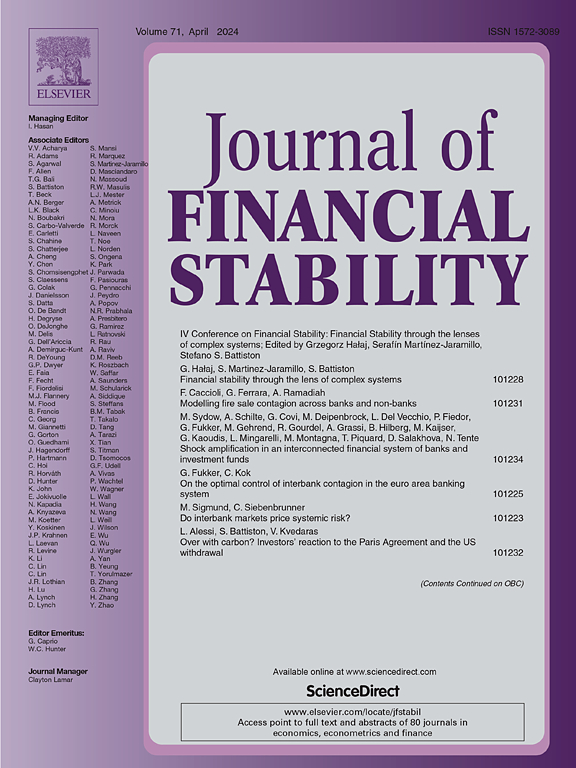Climate information disclosure quality and systemic risk in the U.S. banking industry
IF 4.2
2区 经济学
Q1 BUSINESS, FINANCE
引用次数: 0
Abstract
Enhancing climate information disclosure quality in the banking sector improves transparency, reduces information asymmetry, and strengthens financial stability. We explore the effect of high-quality climate information disclosures, extracted from 271 U.S. banks’ annual reports from 2015 to 2024, on systemic risk. We use the deep learning model to identify climate-related risk, neutral, and opportunity texts in U.S.-listed banks’ annual reports, focusing on their specificity. Based on these texts, and banks’ actual transition and physical risks, we construct a climate information disclosure quality index. This index includes non-symbolic and non-selective disclosures, measuring the transparency of banks’ climate disclosures. We find that improved climate disclosure quality reduces information asymmetry, mitigates market risk, and weakens systemic risk. Endogeneity tests and robustness checks support the findings. Increased investor attention amplifies the positive impact of climate disclosures. Finally, for financially unhealthy banks, the effect of enhanced disclosure quality is more significant.
美国银行业气候信息披露质量与系统性风险
提高银行业气候信息披露质量,提高透明度,减少信息不对称,增强金融稳定。我们探讨了高质量气候信息披露的影响,提取自271 美国银行2015年至2024年的系统性风险年度报告。我们使用深度学习模型CLIMATEBERT来识别美国上市银行年报中与气候相关的风险、中性和机会文本,重点关注其特殊性。在此基础上,结合银行的实际转型和物理风险,构建了气候信息披露质量指标。该指数包括非象征性和非选择性披露,衡量银行气候信息披露的透明度。研究发现,气候信息披露质量的提高降低了信息不对称,降低了市场风险,减弱了系统性风险。内生性检验和稳健性检验支持研究结果。投资者关注的增加放大了气候信息披露的积极影响。最后,对于财务状况不佳的银行,提高披露质量的效果更为显著。
本文章由计算机程序翻译,如有差异,请以英文原文为准。
求助全文
约1分钟内获得全文
求助全文
来源期刊

Journal of Financial Stability
Multiple-
CiteScore
7.70
自引率
9.30%
发文量
78
审稿时长
34 days
期刊介绍:
The Journal of Financial Stability provides an international forum for rigorous theoretical and empirical macro and micro economic and financial analysis of the causes, management, resolution and preventions of financial crises, including banking, securities market, payments and currency crises. The primary focus is on applied research that would be useful in affecting public policy with respect to financial stability. Thus, the Journal seeks to promote interaction among researchers, policy-makers and practitioners to identify potential risks to financial stability and develop means for preventing, mitigating or managing these risks both within and across countries.
 求助内容:
求助内容: 应助结果提醒方式:
应助结果提醒方式:


